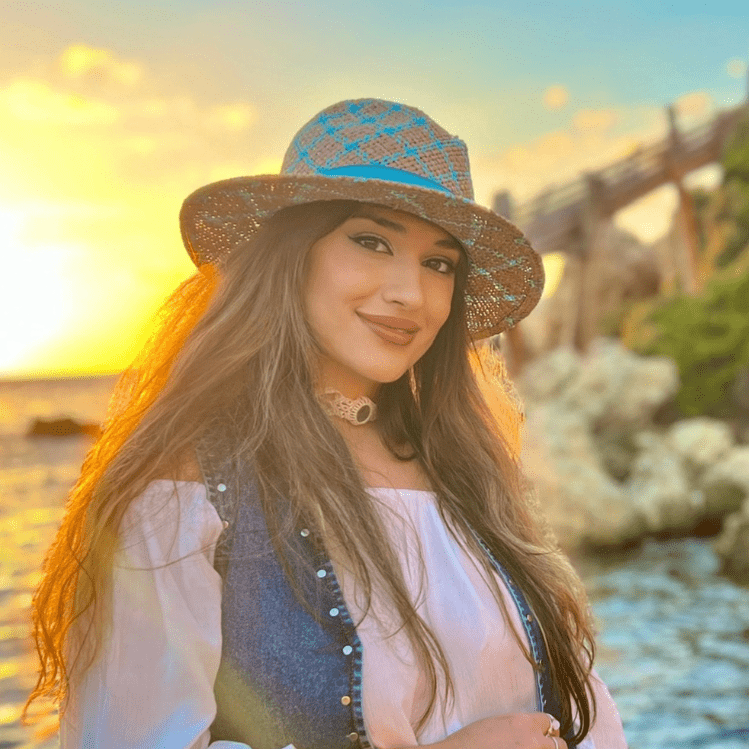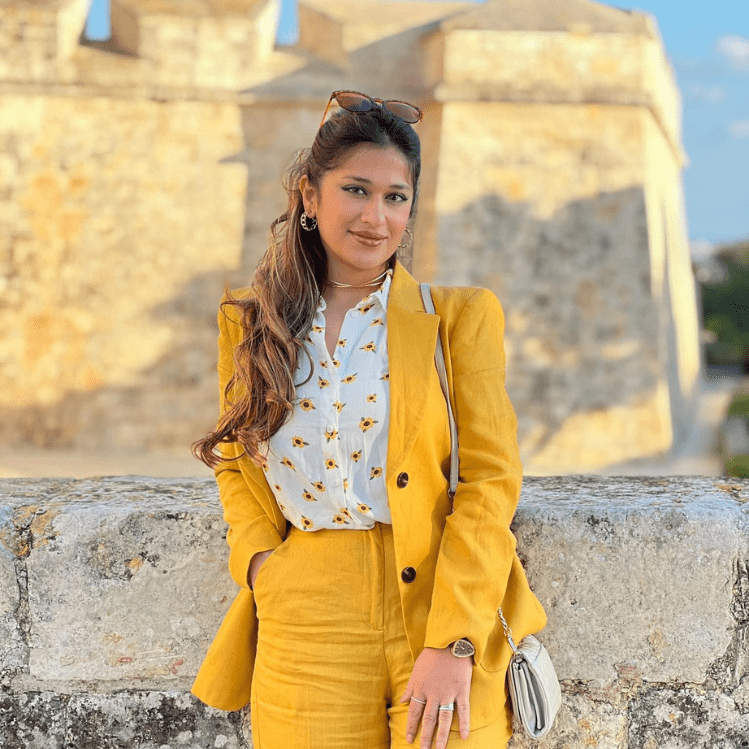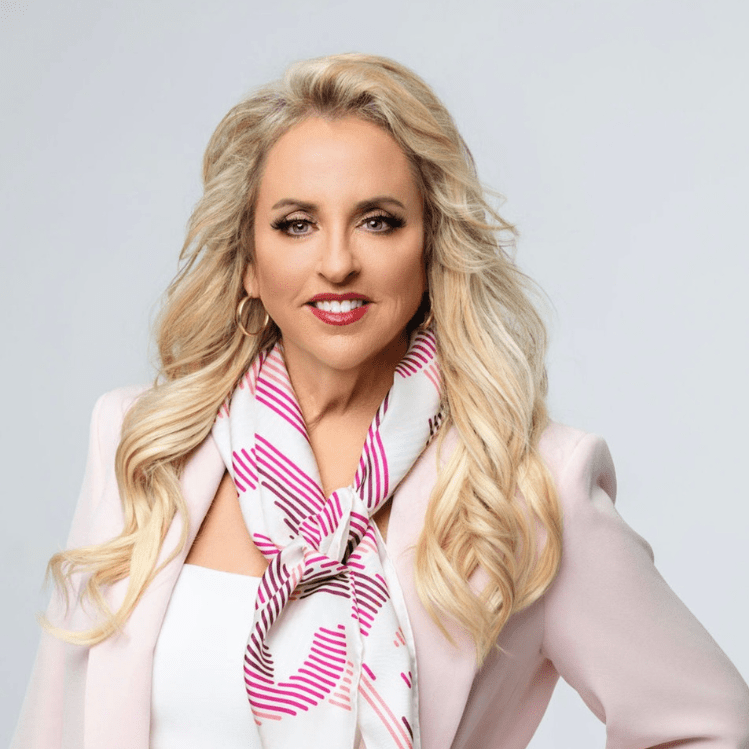
Designing a New Life: Balas Haji’s Journey from Kurdish Roots to Dutch Dreams
Balas Haji, originating from the Kurdish region of Iraq and now living in the Netherlands, has experienced a life marked by significant opportunities and challenges as a refugee child. Navigating through these experiences has not only shaped Balas’ resilient spirit but also ignited a deep passion for fashion. This passion is expressed through unique clothing pieces that intricately blend Kurdish heritage with contemporary trends, creating a distinctive style that resonates on a global scale. Since 2023, under the brand Pepule, Balas has been dedicated to crafting designs that do more than just clothe; they tell stories of transformation and healing. Each garment serves as a bridge, connecting women from different cultures and backgrounds through shared narratives and aesthetics. The name Pepule, meaning butterfly in Kurdish, symbolizes this metamorphosis and the subtle yet powerful impact women have on each other’s lives. Through these meaningful designs, Balas and Pepule aim to inspire, heal, and unite women around the world.
Can you describe your early life in the Kurdish region of Iraq and the circumstances that led your family to seek refuge in the Netherlands?
My family and I were forced to leave our home like many other families during that time because of the cruelty of the ruling party the Baath regime, under leadership of Saddam Hussein.
As a child of nine years old that was just learning how to make and write correct Kurdish sentences at school, I remember above all the warmth and coziness of my grandparents’ house where I grew up at that time. My school mates when we were playing during the breaks and my trusted neighborhood. Everyone was somehow related to each other.
This part I remember the most, because it was the part that I missed the most when we had to leave.
Besides the warmth and beautiful memories there were also another part, a part where I as a child could sense the fear and unstable situation when we went outside our home. Fear of another conflict that will lead to attacks. Children feel a lot, especially when the elder are living in uncertainty and have to live cautiously to survive.
In my time there I heard once a severe bombing and that stayed with me for a very long time.
When I was studying in Sweden I heard the same noise back when they were having a celebrating for the PHD announcement, and I got so scared because the of the survival mode I carried within me as a child that grew up in an area where war and conflict was the common lifestyle.
Luckily we made it to the Netherlands, but the feeling of survival didn’t end right there, quite the opposite. We were still in uncertainty whether we could stay or not.
It was so nice that we as children could play outside without fear. That the playgrounds were filled with laughter and not the worrying mothers.
Giving place to certain emotions is truly a process, now I look back I do feel how hard it must have been for our parents to make this decision.
How did your experience as a refugee child influence your perspective on life and your approach to challenges?
That life isn’t always ending where you think it will. No matter how hard the situation is, if there is a will, there will always be a way to figure it out. I think life is like a coin with two sides, it is not easy to grow up somewhere and leave it all behind. But now I have grown up in another place, it taught me so many beautiful life aspects like openness, positivity and a great sense of emotional intelligence. To enjoy the journey and have faith. Being different isn’t always bad, you just have to stay true to yourself. Many are afraid of the unknown but dare to dream and take a leap of faith!
I am still learning and take it day by day with my goals in my mind.
With these thoughts in my mind, I find it also important to be grateful, because with faith and gratitude there will always be joy and fulfillment.
What were the most significant challenges you faced when you first moved to the Netherlands, and how did you overcome them?
This is a difficult question; it requires a lot of explanation. My life didn’t only start and end when we were fleeing the first time. To answer the question clearly, I will explain the two stages of my life. The first time when we were seeking refuge and the second time when I moved back to the Netherlands out of a conscious choice.
The difference lies in the idea behind the moving. The first time, when I was a child, we truly had to flee and so at the beginning I did not know what was happening. I thought we would just move to another country to stay there for a short while and move back later on. But it wasn’t like this, but as a child it is easier to cope and integrate to the society.
At that time the language and the cultural differences I did find quite difficult, so I focused so much on learning the language as fast as I could to communicate and make friends. It was quite exciting at that time. Once I learned the language, I focused on the lessons I loved the most at school which was music and history. We were living in a little village where different culture was not so much to be seen, so I was always looked at like a stranger, an outsider. The music class was for me a true relief at that time. I could fully be myself; I was different anyway!
I moved away from the Netherlands when I was 18 years old, it was a truly risky choice, but I had to leave and explore the world the way I wanted, and I am glad I did. When I moved back the second time, I felt so overwhelmed by homesickness that I did not know how to handle it. Everything had changed within a period of ten years, even I had changed. I missed home so terribly much and felt so strong for all the families that made the choice to leave their home out of despair instead of hope. I felt like I had to start from scratch again, because of the fact that I knew that I had to take time to re-integrate and start from there. That was truly a challenge to me and I learned the most out of it. I faced it with patience, and compassion. I made the decision to move back by choice, but fleeing feels like you are choice-less. Somehow, I understood the other generation so much more, and their struggle with integration and adapting into a new culture. Along with the first time we moved to the Netherlands I truly learned that life isn’t always colorful but the older we get, the more conscious we become in choosing the most beautiful color pencil to color our life the way we want in order to make a change in our own life and if we are lucky enough we can become a good change in someone else’s. I overcame the homesickness. by asking myself over and over again what I want from life, and every single time I got the same answer which is that I want to live life to the fullest with its ups and downs. I hope it is clear that I try to turn a challenge into an opportunity by learning a new perspective on things every time I get the opportunity for it.
After all one that wants to be seen and make a change needs to look at itself first.
How did your educational experiences in the Netherlands, Sweden, and the United States shape your worldview and career aspirations?
I am truly proud of these steps I took in my life.
Now I look back I know that these have been the steps that truly shaped the woman I am today, practical with a stable educational background. It broadens my perspective in every possible way. I learned that you could become who you want and get what you want with equal rights. So set up your goals, no matter how high or impossible it may seem, you will get there.
The Netherlands have been the foundation of my educational development, thirst for learning and creating my imaginations. I became even thirstier when I moved to Sweden. I had to learn a new language, and I did with joy! I started studying philosophy and political science. Learned a new culture and amazing people. What more can I say about that?
In The USA, Arizona, Phoenix I worked in a family business, and I spoke to so many open and free people. I loved the conversations the most.
The sense of liberty and openness of the Americans, the humbleness of the Swedish society and strategic planning of the Dutch people broaden my perspective on life and possibilities.
These experiences together gave me confidence, thrive to set high goals because I knew that it all could come true if you just believe!
What insights did you gain about your Kurdish heritage during your time spent back in Kurdistan, and how did these insights influence your personal and professional life?
The hospitality, flexibility and a willing hand to help. Also, the collectivity and togetherness and bravery of the people. Of course, you know, learn, and hear about your culture but nothing is like living it. I saw from close the rich cultural history background we have, the humbleness and intelligence of the Kurds. It is so beautiful to feel the collectivity and solidarity among us, especially during difficult times.
It completed my character and filled the missing puzzle pieces of my life. My vision became much clearer, whatever I will do in life I will always keep Kurdistan in my heart and mind. I developed the girl that left home at nine years old with the same handwriting that I learned at that time.
I do hope that we will take more time to heal the intergenerational traumas in order to get where we want to be.
Can you share more about the “fiery inspiration and energy” within you and how it has driven your creative processes?
I was a child of my own world. I always have to laugh when I think back. Always motivated to do something different and unique; I saw the world truly unique as well. The only thing that held me back was the feeling of injustice which is I guess a common trauma feeling. I had to overcome the trauma’s that I held within me in order to be able to move forward. I was already very creative as a child, but I lost track of it when I was growing up ad always rushing.
When I launched Pepule for the first time, everything seemed to work in my favor. It was as if a butterfly was guiding my way through it. The funny part is that my two best high school friends from the Netherlands reminded me of my creativity and motivated me through the way. I am truly grateful to have so many beautiful people around me.
I was and I am always into that little extra, whether it is the effort, the courage or the freedom of expression. Even though it requires a lot of courage to try something new, but if you believe you will succeed. So my energy always overcame the fear, it was that fiery push within me to set through with it. The passion I hold within me for fashion, beauty and uniqueness along with my Kurdish roots made me ask myself WHY NOT?
What is the central message behind your brand, Pepule, and how do you incorporate your cultural identity into your designs?
To be authentic. To be your true self, in every aspect of your life. I try to hold it as personal as I can. This started by the choice of the name, the logo and the cards. Everything I do comes with a personal touch and a personal message to the client itself. I also make good use off the social platforms to raise awareness about self-love, healing and compassion by writing texts that comes from the bottom of my heart. I make combinations of my western mindset with my Kurdish identity, after all that is who I am today. My designs are modern and also progressive. I started with using garments that our grandparents used and gave a modern touch to it. It became a trend after all, luckily, I also receive many messages of other woman that tell me that I have inspired them. All of my designs are made with love and joy, you can sense that when you wear it. It describes the struggle, the pain, resilient and also perseverance of the Kurds for over the years.
Art is a great way of expressing emotions, but for the beauty of clothing it should be worn to see the beauty of it. Especially Kurdish haute couture, with its beautiful colors, fabrics and message of rich cultural history of over thousand years. It seeks a lot of attention worldwide.
How do your clothing designs convey messages of healing and connection, particularly among women globally?
Through the texts I use, the messages behind the designs I choose and raising awareness. Emotions are the same everywhere, it may differ in degree and expression. Love and hope connect all humans around the world, so also woman globally.
Pepule means butterfly in Kurdish.
The message of my brand is like the beautiful butterfly that needs that little extra struggle to get out of its cocoon to become one of the most beautiful creatures. This is the same with healing, so Pepule resembles you and I and all the beautiful woman and people around the world.
Can you tell us more about the artistic projects you are currently engaged in and what future projects you are excited about?
The main projects that are keeping my mind busy is finishing a book I have started to write since last year. It will be a great emotional story of self-expressing, love and hope. I have started to write in Dutch, because it is the language I could express my deepest emotions. There are no taboos.
I am also busy with producing an amazing video clip for the Kurdish artist Nariman Baban, making the costume designs as well.
He has been the inspiration behind some of my project along with my husband who is a great movie director and also the creative director behind the beautiful logo of Pepule_Fashion.
For Pepule, I am working on a new collection which may be worn even by you. It will be international with a touch of my Kurdish identity.
Reflecting on your journey, what personal growth have you experienced, and what aspirations do you have for the future, both personally and professionally?
To always stay true to myself, keep an eye open to the beauty of life. It taught me to be careful with my surrounding, to not let anyone hold me back or turn me down. To embrace the uniqueness and be grateful for all the beautiful souls I have met and will meet along the way.
Life is indeed colorful, I just learned where to look to find the beauty. It all started with believing and taking responsibility for my own life to follow my dream and do it with passion.
Professionally I hope to be able to inspire many more persons to follow their dream and listen to the beautiful voice within their selves to move forward instead of holding back.
I do believe there is much more hope to believe in for the unity of all humans around the globe, especially for the Kurds of all 4 parts. There will be a design coming up that will also resemble this.
Personally I do hope to make a family, love to embrace my femininity and raise a child of my own. That would be a true life experience with many learning moments.

APPLY TODAY
100 Top Global Women Entrepreneurs – Global Woman Magazine
Our Journey in 12 Months:
Our Journey in 12 Months – Global Woman Magazine
5 Things That Show Money is Not Evil:
5 Things to Show That Money Is Not Evil – Global Woman Magazine
Global Man Magazine Page:
Global Woman, Global Man: Socials:
Global Woman Magazine (@global_woman.magazine) • Instagram photos and videos





